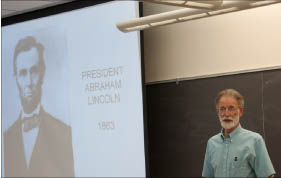
By Daniel Weinshenker
Correspondent
Daniel Crofts, professor of American history, exposed a new side of President Abraham Lincoln in his presentation “Abraham Lincoln: From Political Obscurity to President-Elect” in a politics forum sponsored by the Political Science Department on Thursday Sept. 23.
“I want to erase the current image of a mythic Lincoln that wanted to completely erase slavery,” Crofts said.
Crofts dispelled the commonly held notions that Lincoln was a vehement abolitionist whose primary purpose in leading the Union in the Civil War was to bring an end to slavery. According to Crofts, Lincoln had moderate views on slavery and his real focus was to keep the Union together at all costs, even if that meant war.
“Abraham Lincoln cared more about political power than slavery,” Crofts said.
The professor explained his ideas not by discussing Lincoln’s actions as president, but by focusing on his early political career and path to becoming the president. Crofts discussed Lincoln’s short time in Congress, involvement within Illinois state politics and rise to popularity as the Republican presidential candidate.
Crofts began the presentation with Lincoln’s early commitment to Congressman Henry Clay’s Whig Party. However, the political party began to lose momentum during this time period.
“Although the Whig party had strong ideals, like education, the party started to fall apart due to nativist out lash and the Democrats in Congress passing the Kansas Nebraska Act,” Crofts said.
After the failure of the Whig party, Lincoln started to build a strong Republican party in Illinois. He started to make alliances with the likes of Lyman Trumbull, Joseph Gillespie and Owen Lovejoy, all of whom would be instrumental in the support of John C. Fremont as the first Republican presidential candidate.
“Abraham Lincoln first demonstrated his strong political sense when he gave up his senate seat to Trumbull, this would later prove to be extremely beneficial for the Republican Party,” Crofts said.
The next pivotal point for Lincoln was the Lincoln-Douglas Debates, which threw Lincoln into national attention. The debates turned him into a figure throughout the country.
Crofts used maps to show the dramatic change in voter demographics between the Democratic sweep in 1856 election to Lincoln’s victory in 1860. The sweep was not due to Lincoln as a candidate, but the country’s polarization.
“1860 was an election not won but lost,” said one professor in the audience.
After his election, the Deep South began to secede and the then Secretary of State, William Seward, said that he would rather go to war than have peaceful separation.
After the presentation, Crofts opened up to audience questions and comments. Many members of the audience found parallels between the election of 1860 and the unrest of today’s current political and economic climates.
“The South must have watched Fox News,” one staff member said jokingly.
Crofts concluded that Lincoln was not the mighty abolitionist history remembers him as.
“He played the cards he was dealt, and played them brilliantly,” he said.






